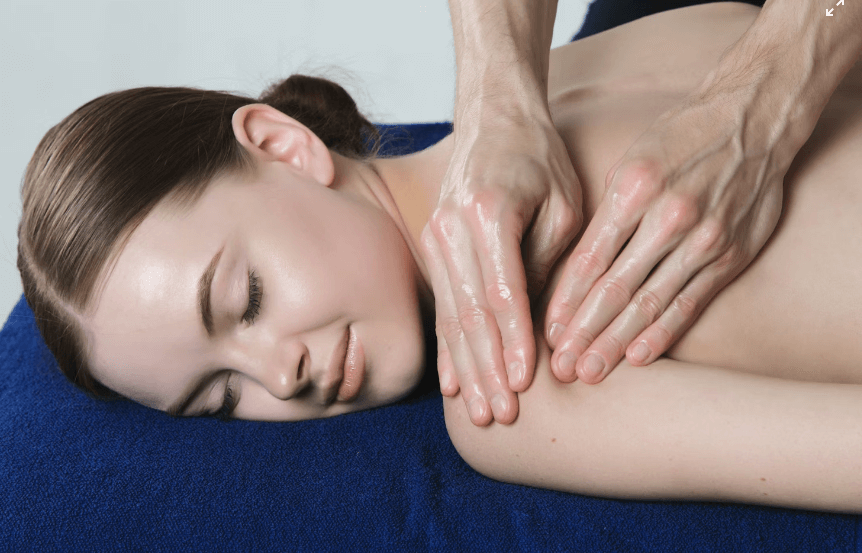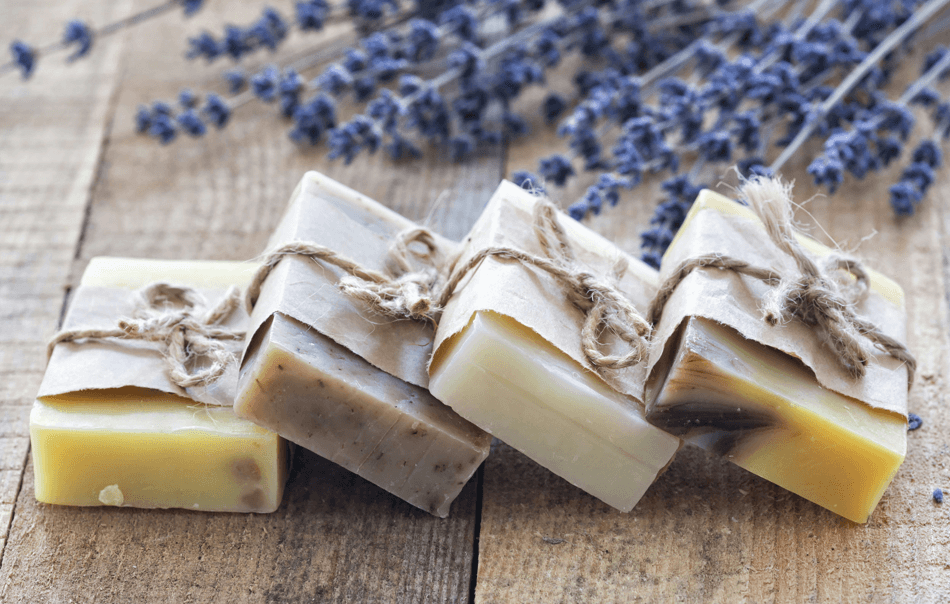Navigating Skincare During Pregnancy: Understanding the Safety of Hyaluronic Acid, Azelaic Acid, and More

Pregnancy is a time of significant change, not just emotionally and physically, but also in terms of skincare. With a myriad of products on the market and an even longer list of ingredients to decipher, it's crucial for expectant mothers to understand what's safe for their skin and their growing baby.
This comprehensive guide will delve into the safety of using hyaluronic acid, azelaic acid, alpha hydroxy acid, and other common skincare ingredients during pregnancy.
Key Takeaways:
- Safety First: Learn which skincare ingredients are safe to use during pregnancy and why some, like salicylic acid, are best avoided.
- Expert Insights: Discover the recommendations from healthcare providers and clinical dermatology regarding the use of skincare products during pregnancy.
- Alternatives and Precautions: Find out about safer alternatives to common skincare ingredients that may pose risks during pregnancy.
Hyaluronic Acid in Pregnancy: A Hydration Hero
Hyaluronic acid is a naturally occurring substance occurring in our bodies, and well known for its incredible ability to retain moisture.
When it comes to hyaluronic acid in pregnancy, most pregnant women can breathe a sigh of relief. This ingredient is considered safe for topical use and can be a hydrating addition to a pregnancy skincare routine.
Its large molecular size means it's unlikely to be absorbed into the bloodstream in significant amounts, making it a low-risk choice for maintaining skin hydration without worrying about potential harm to the developing fetus.
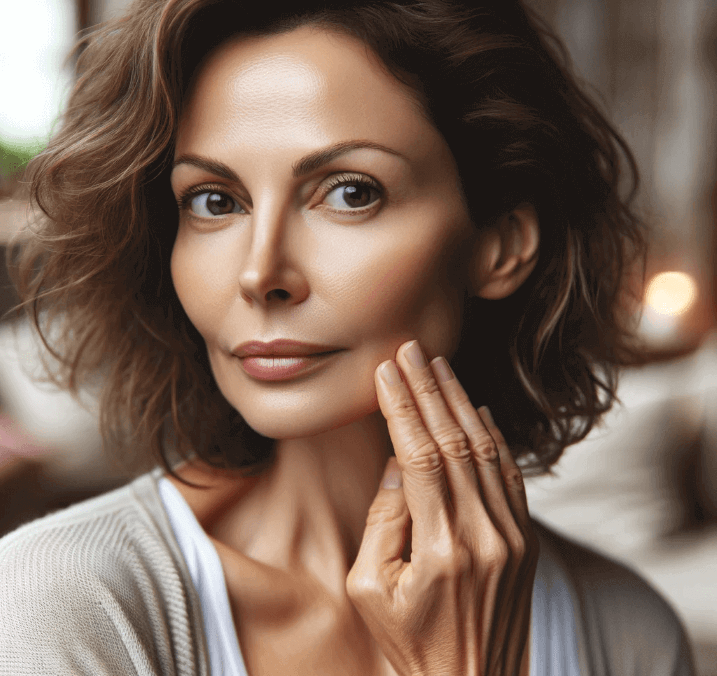
Azelaic Acid: A Safe Bet for Expectant Mothers
Azelaic acid is another ingredient that has been deemed safe during pregnancy by many healthcare providers.
It's often recommended to treat acne and other skin concerns, thanks to its anti-inflammatory properties. Azelaic acid works by killing acne-causing bacteria and helping to keep pores clear.
For those wondering what percentage of azelaic acid is safe during pregnancy, products with concentrations up to 20% are generally considered safe for topical application, providing a good balance between efficacy and safety.

The Alpha Hydroxy Acid Debate
Alpha hydroxy acids (AHAs), such as glycolic acid and lactic acid, are popular in anti-aging products and treatments for their exfoliating properties. The use of AHA during pregnancy is a topic of discussion among dermatologists.
While low concentrations of these acids are generally considered safe for topical use, high doses or in-office AHA peels should be approached with caution. Pregnant individuals should consult with a board-certified dermatologist to determine the appropriate use of these products.
Salicylic Acid: A Cautionary Tale
Salicylic acid, a beta hydroxy acid (BHA), is commonly found in acne products. However, it's one of the ingredients that pregnant people wonder about the most.
Why is salicylic acid bad during pregnancy? In high doses or oral administration, it has been associated with birth defects and pregnancy complications. While low-dose topical application, such as in face washes or lotions, may be considered low risk, many healthcare providers advise against its use, especially in the first trimester.
It's best to err on the side of caution and seek alternatives for managing inflammatory acne during pregnancy.
Alpha Arbutin: Proceed with Caution
Alpha arbutin is a skin-brightening agent that works by inhibiting the production of melanin. While there is limited research proving its safety or risk during pregnancy, it's structurally similar to hydroquinone, which is not recommended for pregnant individuals.
Due to the lack of substantial medical or animal research, alpha arbutin is often placed in the category of skincare ingredients to avoid until more information is available.
Azelaic Acid While Pregnant: A Closer Look
Azelaic acid's safety profile makes it a go-to recommendation for managing acne and hyperpigmentation during pregnancy. It's a naturally occurring acid that has been studied extensively and is considered safe for use during pregnancy and lactation.
Its effectiveness in treating acne without the risks associated with other ingredients makes it a staple in many pregnancy-safe skincare routines.
Salicylic Acid Pregnancy-Safe Alternatives
For those seeking alternatives to salicylic acid during pregnancy, ingredients like glycolic acid and lactic acid can be safer options when used in low concentrations.
Azelaic acid is another alternative that not only helps with acne but also addresses pigmentation issues. Always consult with a healthcare provider before incorporating new products into your skincare routine during pregnancy.

Benzoyl Peroxide: A Double-Edged Sword in Pregnancy Skincare
When it comes to managing acne during pregnancy, benzoyl peroxide often enters the conversation. It's a common ingredient found in many over-the-counter skin care products, lauded for its effectiveness in combating acne-causing bacteria.
However, its safety profile during pregnancy is a bit more complex. While some studies suggest that when applied topically, benzoyl peroxide is minimally absorbed into the skin, thus posing a low risk to the developing fetus, it's always best to consult with a board-certified dermatologist before incorporating it into your regimen.
Animal studies have not definitively established its safety, leading to a cautious approach among healthcare providers. Pregnant individuals seeking acne treatments should weigh the benefits against potential risks.
Alternatives may be recommended, and it's crucial to remember that no skin care product should replace medical advice from a trusted professional. When in doubt, opting for gentler, pregnancy-safe topical products may be the wiser path to clear skin.
Sodium Hydroxide in Pregnancy Skincare: A Delicate Balance
When it comes to pregnancy skincare, the mention of sodium hydroxide might raise some eyebrows. Commonly known for its role in soap making, this ingredient can also be found in a variety of skincare products. But is it safe for expectant mothers?
The key is concentration. Sodium hydroxide is often used in minuscule amounts to adjust the pH of products, making them more skin-friendly. It's a balancing act that ensures the product is effective without being overly harsh.
However, the conversation doesn't end there. A study published in the International Journal of Women's Dermatology suggests that while low concentrations are generally considered safe, pregnant women should always consult with a board-certified dermatologist.
This is especially true for products that are left on the skin for extended periods. The professional guidance of a dermatologist can help navigate the complexities of ingredients like sodium hydroxide, ensuring the safety of both mother and baby.
Vitamin C Serums: A Brightening Choice for Pregnancy
When it comes to anti-aging products during pregnancy, Vitamin C serums are often touted as a safe and effective option.
Unlike Retin A, which is generally advised against during pregnancy, Vitamin C provides antioxidant protection and helps in collagen synthesis, which can reduce the appearance of fine lines and brighten the complexion. It's a gentler alternative that can be used to maintain skin radiance without the associated risks of stronger retinoids.
However, it's always highly advisable to consult with a dermatologist before incorporating any new product into your pregnancy skincare routine. While Vitamin C is widely regarded as safe, every pregnancy is unique, and what works for one person may not be suitable for another.
A dermatologist can provide personalized advice and ensure that any skincare product, including Vitamin C serums, aligns with your specific needs and health considerations during this delicate time.
Niacinamide: A Versatile Vitamin for Pregnancy Skincare
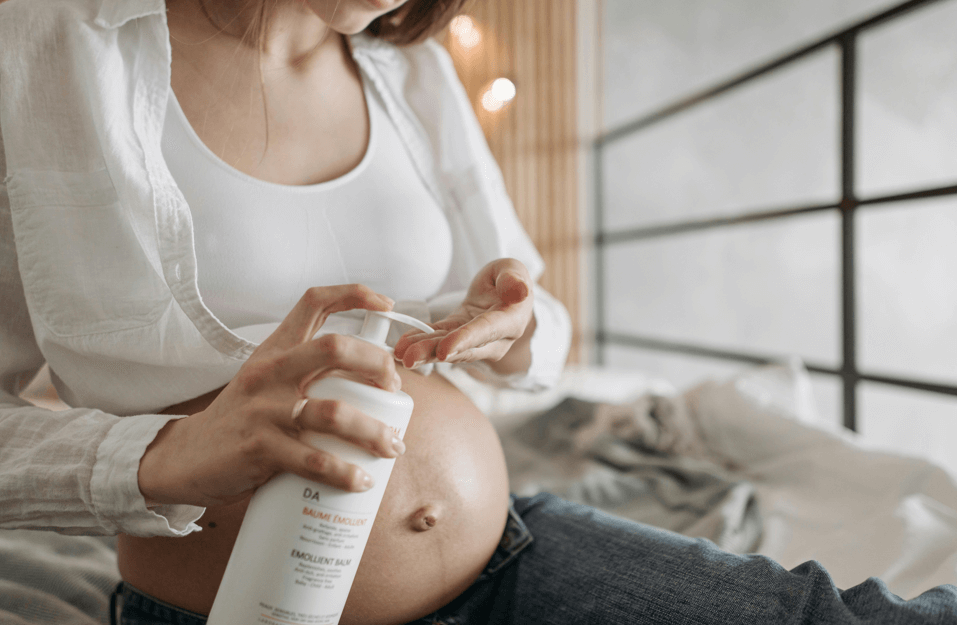
When it comes to anti-aging products during pregnancy, niacinamide is a powerhouse ingredient that deserves attention. It's a form of vitamin B3 that not only helps with fine lines and wrinkles but also improves skin elasticity and reduces inflammation.
Its safety profile, makes it a go-to for expectant mothers looking to maintain their skincare routine without compromising the health of their baby. Niacinamide is gentle and effective, providing a soothing effect on the skin, which can be particularly beneficial as hormonal changes can lead to sensitivity and irritation.
Studies published in the International Journal of Women's Dermatology have highlighted niacinamide's ability to regulate sebum production and minimize the appearance of pores. This makes it an excellent option for those dealing with pregnancy-induced acne or oily skin.
Unlike some other anti-aging ingredients that are off-limits during pregnancy, niacinamide can be used with peace of mind, offering a brightening effect that keeps the skin looking youthful and radiant. It's a versatile ingredient that can be found in various over-the-counter products, making it accessible for pregnant women everywhere.
Glycolic Acid: The Gentle Giant for Pregnancy Skincare
When it comes to anti-aging products during pregnancy, glycolic acid often emerges as a gentle yet effective option. As an AHA (alpha hydroxy acid), glycolic acid works by exfoliating the top layers of skin, revealing a brighter and smoother complexion.
According to the International Journal of Women's Dermatology, low concentrations of glycolic acid are generally considered safe for pregnant women. This is because they do not deeply penetrate the skin, thus minimizing any potential risk to the developing fetus.
Nevertheless, it's crucial to consult with a board-certified dermatologist before incorporating glycolic acid into your pregnancy skincare routine.
While over-the-counter products typically contain lower concentrations, in-office AHA treatments may have higher levels of active ingredients. A dermatologist can provide personalized advice and may recommend products that have been specifically tested for use during pregnancy.
This ensures that you can maintain your skincare regimen without compromising the safety of you or your baby.
The Evolution of Maternal Skincare: Insights from Dermatology Journals

The field of dermatology is constantly evolving, and this includes the realm of maternal skincare. The Journal of Women's Dermatology is a treasure trove of information, offering insights into the latest research and recommendations for skincare during pregnancy. I
t's a resource that can help expectant mothers navigate the complex world of ingredients and products, ensuring they make informed decisions. For instance, the journal provides evidence-based guidelines on the use of anti-aging products, helping to demystify which ingredients are safe and which should be avoided.
Moreover, the international community of dermatologists contributes to a broader understanding of maternal skincare practices. By examining studies and clinical trials from around the world, the International Journal of Women's Dermatology helps to establish global standards for safe skincare in pregnancy.
This international perspective is invaluable for both healthcare providers and pregnant women, as it promotes a well-rounded approach to skincare that takes into account diverse practices and recommendations. It's through this collaborative effort that expectant mothers can enjoy the benefits of anti-aging products without compromising their health or that of their unborn child.
Professional Skincare Treatments: Consulting with Experts
Pregnancy doesn't mean you have to put your skincare treatments on hold, but it does mean you need to be more selective.
In-office AHA treatments, for example, can be tailored to be safe for pregnant women when performed by a board-certified dermatologist. These professionals can adjust concentrations and formulas to ensure they're effective without posing any risk to the mother or the developing fetus. It's crucial to have an open dialogue with your skincare provider about your pregnancy so they can recommend the most appropriate treatments.
The Journal of Women's Dermatology often discusses the importance of professional guidance when it comes to skincare during pregnancy. While over-the-counter products are widely available, in-office treatments can provide targeted results with a higher level of safety when overseen by a dermatologist.
Whether it's a gentle chemical peel or a hydrating facial, these treatments can help manage the unique skin challenges that come with pregnancy. Always consult with your healthcare provider before undergoing any professional skincare treatments to ensure they align with your pregnancy skincare needs.
Peptide-Based Moisturizers: A Safer Anti-Aging Approach
Peptides are another ingredient to consider when looking at anti-aging products during pregnancy. These small chains of amino acids are the building blocks of proteins like collagen and elastin, which are crucial for maintaining firm, youthful skin.
Peptide-based moisturizers can help signal your skin to repair itself, leading to reduced appearance of wrinkles and improved skin texture, all without the risks associated with Retin A or other potent retinoids.
The efficacy and safety of peptides in pregnancy skincare have been discussed in various publications, including the International Journal of Women's Dermatology and the Journal of Women's Health. These studies suggest that peptides can be a safe and beneficial addition to a pregnancy skincare regimen.
However, as with any skincare product during pregnancy, it's essential to get the green light from your healthcare provider before starting use, especially if you're considering in-office AHA treatments or other professional procedures.
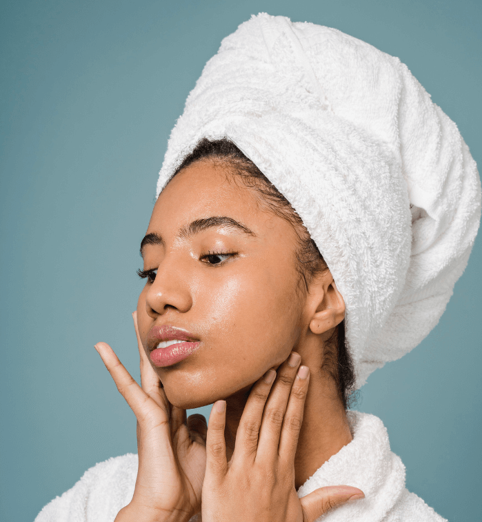
BHA Peels and Pregnancy: A Sensitive Subject
BHA peels, known for their deep exfoliating properties, are a popular in-office treatment for tackling a myriad of skin concerns. But when it comes to pregnancy, the safety of BHA peels becomes a sensitive subject.
BHAs, or beta hydroxy acids, penetrate deeply into the pores and can be quite potent. While low-strength over-the-counter products might be considered safe by some, the higher concentrations used in professional peels warrant caution.
The Journal of Women's Dermatology often highlights the importance of erring on the side of caution during pregnancy. Given the lack of extensive research on the effects of high-concentration BHA peels on pregnant women, many experts advise against them.
Instead, they recommend gentler alternatives or postponing such treatments until after pregnancy. It's always best to discuss any skincare treatments with a healthcare provider to ensure they align with what's best for you and your baby's health.
Anti-Aging Products and Pregnancy: Navigating the Fine Line
Anti-aging products are a staple in many skincare routines, but during pregnancy, their use becomes a topic of scrutiny. Ingredients commonly found in these formulations, such as retinoids (including Retin-A) and certain acids, can be contraindicated due to potential risks to the unborn child.
The International Journal of Women's Dermatology and the Journal of Women's Dermatology have published articles that delve into the complexities of using anti-aging products during pregnancy, highlighting the need for caution and consultation with healthcare professionals.
In-office AHA (alpha hydroxy acid) and BHA (beta hydroxy acid) peels are procedures that may be offered as anti-aging treatments. While AHAs are sometimes considered safer for use during pregnancy, BHAs like salicylic acid are generally advised against.
It's essential to discuss any in-office procedures with a trusted medical adviser who understands the nuances of pregnancy-related skin care. They can provide guidance on which treatments are safe and which should be avoided, ensuring both the health of the mother and the developing baby are protected.
Sunscreen Ingredients Substantiated for Pregnancy
When it comes to sunscreen, zinc oxide and titanium dioxide are the go-to ingredients for pregnant individuals. These sunscreen actives are considered safe during pregnancy as they provide physical protection against UV rays without the risk of systemic absorption. They can be found in a variety of sunscreen products, including creams, lotions, and even lip balms.
The Role of Topical Retinoids in Pregnancy
Topical retinoids, such as retinoic acid and generic tretinoin, are commonly used to treat acne and signs of aging. However, they are not recommended during pregnancy due to the risk of fetal damage.
Prescription retinoids, in particular, have been linked to birth defects and should be avoided. If you're using retinoids and planning to become pregnant or are already pregnant, it's crucial to discuss alternative treatments with your dermatologist.
AHA Peels: Are They Safe During Pregnancy?
In-office AHA peels involve higher concentrations of alpha hydroxy acids and are often used for more intensive skin treatments.
While there is no direct evidence linking AHA peels to adverse pregnancy outcomes, the lack of substantial research and the potential for higher systemic absorption warrant caution. Pregnant individuals should consult with their healthcare provider before undergoing any chemical peel treatments.
Eye Creams and Pregnancy: What to Look Out For
Eye creams often contain active ingredients like retinoids, alpha hydroxy acids, and vitamin C. While vitamin C is generally considered safe for use during pregnancy, it's important to review the other ingredients in eye creams.
Avoid products with retinoids and opt for those with ingredients that have a proven safety record for pregnant individuals.

Understanding the Risks of High Doses
When it comes to skincare ingredients, the concern often lies with high doses or systemic absorption. Ingredients like salicylic acid and retinoids, when taken orally or used in high concentrations topically, can pose significant risks during pregnancy.
It's essential to stick to low concentrations and products that are specifically labeled as safe for use during pregnancy.
Global Health Perspectives on Skincare in Pregnancy
The field of global health emphasizes the importance of environmental health, including the safety of cosmetic products used during pregnancy.
International guidelines and research from organizations like the International Journal of Women's Health and the Journal of Women's Dermatology provide valuable insights into the safe use of dermatologic medications and skincare products for pregnant individuals around the world.
Navigating Topical Medications with Your Healthcare Provider
Your healthcare provider is your best resource when it comes to using topical medications during pregnancy. They can provide personalized advice based on your medical history and the latest clinical dermatology research.
Always consult with them before making any changes to your skincare routine or starting new topical treatments.
Summary
Navigating the world of skincare during pregnancy can be daunting, but armed with the right information, expectant mothers can make informed decisions about their skincare routines.
Hyaluronic acid and azelaic acid are generally considered safe for use during pregnancy, offering hydration and acne treatment without significant risks. Alpha hydroxy acids, when used in low concentrations, can also be part of a pregnancy-safe skincare regimen.
However, ingredients like salicylic acid and retinoids should be avoided due to their association with potential risks to the developing fetus. Always consult with a healthcare provider before incorporating new skincare products during pregnancy, and opt for ingredients with a proven safety record.
FAQ Section
Q: Can I use salicylic acid face wash during pregnancy? A: While low-dose topical salicylic acid may be considered low risk, many healthcare providers recommend avoiding it during pregnancy, especially in the first trimester. Consult with your healthcare provider for personalized advice.
Q: What skincare ingredients should I avoid during pregnancy? A: Pregnant individuals should avoid high doses of salicylic acid, retinoids, and other ingredients that have been linked to birth defects or other pregnancy complications. It's best to consult with a healthcare provider for a comprehensive list of ingredients to avoid.
Q: Are there any safe acne treatments I can use during pregnancy? A: Yes, azelaic acid is often recommended as a safe and effective acne treatment during pregnancy. Low concentrations of glycolic acid and lactic acid may also be safe alternatives. Always consult with your healthcare provider before starting any new acne treatments during pregnancy.



